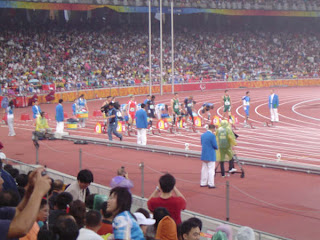 From David Rotter, Scheck & Siress prosthetist:
From David Rotter, Scheck & Siress prosthetist:With some remarkable experiences already under my belt, today was the day that I've been especially looking forward to:
Melissa Stockwell's competition in the Paralympic Games.All of Melissa’s fans met as a group at the hotel and walked to the Water Cube together. Walking into the Olympic Village for the first time is incredibly impressive. Once you get to the main square you can fully appreciate just how massive a complex the Village is.
The Water Cube, where all the swimming takes place, is probably the most interesting of all the buildings. As you get closer you realize that it does not have solid walls but rather a transparent exterior made from a heavy cloth/plastic. You can see the steel endoskeleton structure underneath as you get closer to the building. There are projectors behind the exterior walls. This is how the Water Cube changes colors at night: it projects the light from the inside out.
Once you go in, you see the inner part of the Cube is constructed with plastic panels. The shapes resemble amoeba-like water droplets strung together with a steel frame, an incredibly interesting artistic structure.

The pool is awesome! The energy and excitement is palpable as you walk in and see the athletes doing warm-up laps. We all spotted Melissa and went nuts!
We easily have the largest cheering section, complete with matching Melissa T-shirts and visors. Melissa looks awesome warming up in the pool.

Melissa’s round is the very last of the session, leaving us all waiting in anticipation. The races were amazing! We all marveled at the determination and will of the racers. There is an intricate classification system pairing racers together that I still don’t fully understand. You will see some races where you have amputees racing against people with all their limbs that have some other type of deficit.
Some of the visually impaired racers have enough sight that they can be totally independent, contrasted by the high-level involved quadriplegics and paraplegics who need assistance getting in and out of the water. The crowd was great cheering on their home countries and giving encouragement to every racer to finish the race.
Finally…the moment we had all been waiting for arrived. It was time for Melissa to swim the 100-meter butterfly. Melissa walked out to the pool deck and our section erupted! We were easily the loudest fans, even louder than the raucous Australians! I think we were all more nervous than Melissa!

The crowd got quiet in anticipation of the starting horn and then….explosion! The place went nuts with cheering. I was screaming the whole time: “Swim! Swim! Go! Go!”
Unfortunately, as Melissa herself described in her blog, today was not to be.
Melissa swam her heart out but failed to qualify for the final round. She is a champion to us all! She races again tomorrow in the 100-meter freestyle.

We all got a chance to walk around the Olympic Village and take in the different sights. We even got a surprise chance to visit with our champ. We spent about 20 minutes in the Water Cube with Melissa. She was disappointed by the morning race, as can be expected, but looks great!
Tomorrow is another day and another opportunity!
 From David Rotter, Scheck & Siress prosthetist:
From David Rotter, Scheck & Siress prosthetist:

























